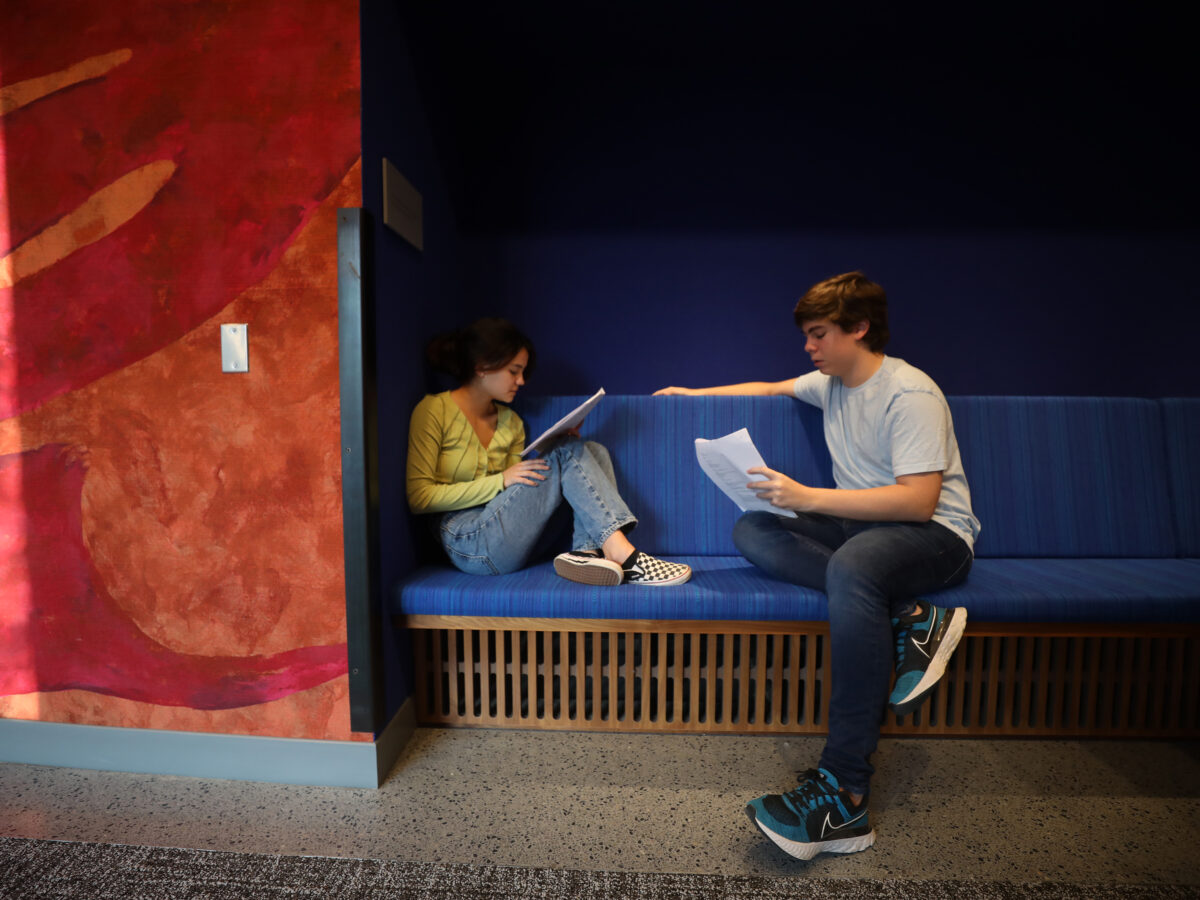Exploring identity through theater

Blythe de Oliveira Foster ’97 sits cross-legged atop a rehearsal cube onstage in the Actor’s Lab of the Goel Center for Theater and Dance, as a group of about 20 students face her in the rows of black-and-white patterned seats. All are members of the New Play Reading Ensemble, a brand-new theater opportunity that focuses on exploring contemporary plays by a diverse array of BIPOC, LGBTQ+, women and intersectional playwrights.
De Oliveira Foster, a new instructor in the Theater and Dance Department with a background in acting, teaching and producing plays in New York and California, starts today’s rehearsal with a brief check in. One student is simply tired. One is anxious about a chemistry test. Another is “hungry but happy.”
However they were feeling before, the students bubble with energy and laughter as de Oliveira Foster sends them away for 15 minutes to work in pairs on today’s scene, a heated exchange between the two lead characters in L’intrico Del Lupo Mannaro by Nico Grelli.

The New Play Reading Ensemble grew out of a reading series led by instructor emerita Sarah Ream ’75 and Hadley Camilus, associate dean of Multicultural Student Affairs. “The department started to think of how to expand beyond that one reading,” de Oliveira Foster said in an interview. “As an actor with a new plays background, I was thrilled when I learned they were actively looking for someone who was excited about this.”
The group reads both published and unpublished pieces from living playwrights, most of them written within the last three years. De Oliveira Foster curated a selection of texts, and they’ve built on that list based on student input. In addition, ensemble members are pursuing independent projects inspired by their own interests. On Nov. 6, the New Play Reading Ensemble will welcome the larger Exeter community to share its process in an informal workshop presentation of scenes and monologues held in the Actor’s Lab.
Grelli, a trans/genderqueer Italo-Americano filmmaker, screenwriter, director, visual artist and performer, is one of four playwrights who will join the ensemble via Zoom to discuss their work. “I’m excited to connect the students with these specific playwrights as artists and human beings, and for them to engage in conversations about writing and new play development as a dynamic, collaborative process,” de Oliveira Foster said.
Back in the Actor’s Lab, three different pairs take the stage, each taking a markedly different approach to the same lines of dialogue. After each reading, the performers remain on stage for some discussion and feedback from the group.
“Talk to us about your physicality — physical choices, vocal choices,” de Oliveira Foster asks the first pair, Ava Zhao ’24 and Priya Nwakanma ’23.
“The staging said ‘Donnie. 30s. Very Cowboy Elvis. Sincere, romantical, mustachioed as all get out,’” says Nwakanma. “So, I imagined myself with a mustache and took it from there, basically.”
“I was constantly going away, coming back to confront him,” Zhao says of her performance as Alexa Mae, who — no spoilers — discovers something awful about Donnie on their wedding night. “Just trying to be really active, like the drama queen that she is.”

Avalon Marlin ’22 and Niall Bardorf ’24 take a different approach: more subdued and less humorous, with explosive outbursts at key points. “We saw a little more anger between them,” Marlin explains. “But then towards the end we were maybe starting to reconnect a little bit.”
De Oliveira Foster asks the group what they learned about the scene, based on this interpretation. “I really like the relationship between you two on stage,” offers Stellan Aalto ’23 to Marlin and Bardorf. “You [Avalon] were more tied down to reality, whereas Niall’s just like unraveling, spiraling down.”
After checking in with Zhao, the ensemble’s stage manager, de Oliveira Foster confirms there’s time for two solo readings: Nwakanma has prepared a monologue from Fairview by Jackie Sibblies Drury, while Sinna Oumer ’23 will read from work by Sahar Ullah, a playwright and new instructor in Exeter’s English department.
Nwakanma sits in a bright red chair placed center stage, but quickly hops up and begins moving around as she reads. Her monologue, which comes near the end of Drury’s Pulitzer Prize-winning play, features a stunning moment where her character, Keisha, breaks the fourth wall and asks white audience members to switch places with the Black cast members.
“Could I say, ‘Hi, white people,’?” Nwakanma asks. “Let me and my family go out to where you always sit. Could I say that?” Amid slightly nervous laughter, Marlin and Bardorf join her onstage, along with Aidan Hanson ’23.
“This was really emotional for me…when I was first reading it, and I wanted to have that come across,” Nwakanma tells the group after she finishes. She thanks her classmates for coming up onstage with her.
“When this play has been performed and people do this monologue, often the white people stay in the audience,” de Oliveira Foster says. “It’s a testament to the earnestness and the quality of your asking that people joined you — and to the trust that we’re building in the group.”